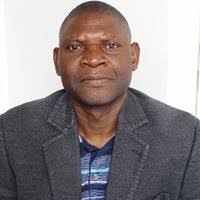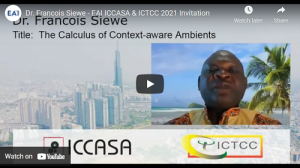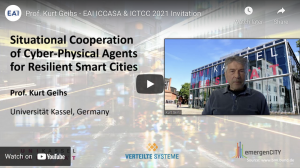
Dr. Francois Siewe
Title: The Calculus of Context-aware Ambients
Bio:
Francois Siewe received a Ph.D. degree in Computer Science from De Montfort University, UK. He obtained a B.Sc. degree in Mathematics and Computer Science, the M.Sc. degree and the Doctorat de Troisième Cycle degree in Computer Science from the University of Yaounde I, Cameroon. He is a Reader in Computer Science and Head of the Software Technology Research Laboratory (STRL) research group in the School of Computer Science and Informatics at De Montfort University (DMU), UK. Before joining DMU, he was a lecturer and visiting researcher in the Institute of Technology of Lens at the University of Artois in France. Prior to this, he was a fellow at the United Nation University/International Institute for Software Technology (UNU/IIST) in Macau in China, and a lecturer with the Department of Mathematics and Computer Science at the University of Dschang, in Cameroon. His research interests include software engineering, formal methods, cyber security, context-aware and pervasive computing, and Internet of Things (IoT). His research outputs can be found at http://www.cse.dmu.ac.uk/~fsiewe/
Abstract:
In the early 1990s, Mark Weiser introduced ubiquitous computing (ubicom) as a new paradigm for the next generation of distributed systems where computers disappear in the background of the user’s everyday activities, making data and services readily available anytime and anywhere. From the era of one-computer-many-users (mainframes) to that of one-computer-one-user (PCs), ubicom envisions an era of many-computers-one-user.
Current realisation of this vision is the Internet of Things (IoT) which enables common objects to be enhanced with sensing, computing and communication capabilities to become smart things capable of collecting, processing and exchanging data over the Internet. How data are collected, processed, and shared, must be tightly controlled in many applications (e.g., smart homes and healthcare) to avoid unintended breaches of privacy.
In this talk, Dr Francois Siewe will present the Calculus of Context-aware Ambients (CCA) which is formal language for modelling the behaviours of ubicom systems. The CCA interpreter ccaPL and CCA model-checking tool ccaSPIN will also be presented and used to analyse IoT systems modelled in the CISCO Packet Tracer.
 Prof. Kurt Geihs
Prof. Kurt Geihs
Title: Situational Cooperation of Cyber-Physical Agents for Resilient Smart Cities
Bio:
Kurt Geihs is a full professor for Distributed Systems in the Electrical Engineering and Computer Science Department at the University of Kassel (Germany) and director of the Interdisciplinary Research Center for Information System Design (ITeG) in Kassel. His research and teaching interests include distributed systems, teamwork in multi-robot systems, and value-oriented software design.
Abstract:
The future smart city crucially depends on information and communication technology (ICT). The functioning of its ICT-dependent infrastructures is endangered by natural disasters, pandemic threats, human and technical failure as well as violence and terror. In large-scale emergency situations it is utmost important to rapidly reestablish the ICT infrastructure as well as other dependent critical infrastructures. In this wider application context we explore the situationally adapted and self-organized cooperation of heterogeneous autonomous agents for emergency operations aiming at the restoration of critical ICT and other infrastructures. Such agent teamwork requires both a software platform that supports the interoperability of cyber-physical agents as well as a common knowledge base that stores general semantic information about the entities of discourse as well as live status information. We present an extension to ALICA – our own multi-agent platform – that integrates the standardized Context Information Interface NGSI-10 as well as the widely used FIWARE models and components for smart cities in order to manage static and dynamic context information in crisis situations. The context information is fused into a common knowledge base that enables the self-organized reasoning of the agents about joint operations plans.
 Dr. Hafiz Mahfooz Ul Haque
Dr. Hafiz Mahfooz Ul Haque
Title: Contextual Defeasible Reasoning Formalisms for Heterogeneous knowledge Sources
Bio:
Dr. Mahfooz has been working with the Department of Software Engineering at the University of Lahore, Pakistan since 2017. He is an active researcher and head of the Autonomous Agents Research Group (AARG). He has authored various papers and book chapters in the reputed journals (ISI indexed) and he was awarded the best paper awards four times in different international conferences. He is a Technical Program Committee (TPC) member of various international conferences and journals and has chaired conference sessions. Dr. Mahfooz received his PhD in Computer Science from the University of Nottingham. His research areas revolve around modeling and reasoning smart spaces using context-aware systems in different domains like smart healthcare, smart parking, and disaster management systems. The focused research and teaching areas include context-aware computing, multi-context systems, semantic knowledge modeling, smart environments modeling and reasoning, modeling and verification of resource-bounded context-aware systems. He has been successfully leveraging his expertise in various industrial research and development projects.
Abstract:
We, human beings, are blessed with the ability of context-awareness. With this, we often exploit contexts (ideas/messages) in our daily lives. These are effectively exchanged based on current situations without explicitly knowing the contextual information. However, the imperfect nature of context sometimes causes inconsistent behavior, which could be addressed using non-monotonic reasoning to resolve potential conflicts with the intention of acquiring new/revised context. A person often changes his mind and rejects his own decisions based on new evidence, even though, these decisions were justified by his own at some previous time. Several situations reflect- the very fact that the core notion of the context directly affects human intelligent behavior. Context-awareness highlights the significance of contexts to be utilized to ease user’s tasks and fulfill their desired objectives. With the advent of the pervasive computing paradigm, context-aware systems acquire contextual information from sensors, embedded sensors in smart devices and information systems, perform reasoning, and then adapt their behavior accordingly. In a smart computing environment, it is a fact that human users interact with the systems dynamically with or without human intervention using different modalities. The core emphasis is given to the intelligent systems that run in a highly decentralized environment with different communication mechanisms. However, the interaction of different knowledge sources in a highly decentralized environment sometimes may produce inconsistent and conflicting results. In this talk, Dr. Mahfooz will discuss the challenges of non-monotonicity in context-aware systems and present the contextual defeasible reasoning-based multi-agent formalisms to handle the inconsistency issues. These formalisms rely on the semantic knowledge sources which allow the systems to model context-aware non-monotonic reasoning agents in order to infer the desired goals using the extracted rules from the ontologies and handles inconsistencies using conflicting contextual information.



